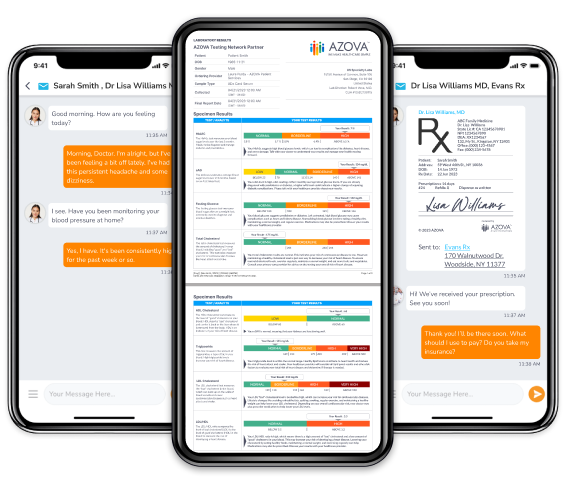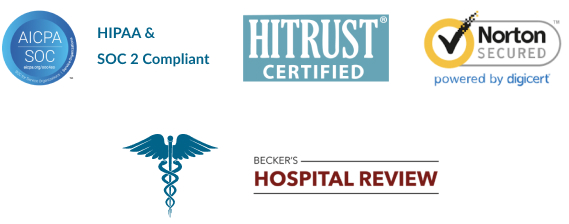Reliable treatment for cough, common cold, flu, and COVID-19, just a click away.
Connect with a board-certified healthcare provider via a quick, secured video visit or messaging. Receive a diagnosis and treatment plan, all without leaving home.
Available in all 50 states.

Understanding the conditions
Cough, cold, flu, and COVID-19 are all respiratory illnesses that, while distinct, share a commonality: they are all caused by viruses that infect the respiratory system. Symptoms like cough, sore throat, and congestion are often experienced across all four, but the severity can vary widely.
These illnesses are highly contagious and can spread through respiratory droplets. While most cases are mild, it’s important to be aware of the potential for complications, especially in vulnerable populations.
The differences between cough, cold, flu, and COVID-19
A cough is a natural reflex that helps protect your airways and lungs. When irritants like mucus, germs, or dust enter your throat, your body responds by forcefully expelling air and particles to clear the passage.
While occasional coughing is normal, persistent coughing or coughing accompanied by other symptoms like shortness of breath or abnormal mucus could indicate a more serious underlying health issue. Coughs are a common symptom of various respiratory illnesses, including the flu and COVID-19.2
The common cold is the mildest of the four conditions. It’s caused by a variety of different viruses, and symptoms typically include runny nose, sneezing, congestion, sore throat, and cough. Most people recover from a cold within a week. While it’s often considered a minor inconvenience, it can be particularly bothersome for those with underlying health conditions.1
Influenza, or flu, is a more severe respiratory illness than the common cold. It’s caused by the influenza virus and is characterized by symptoms such as fever, chills, body aches, fatigue, cough, sore throat, and headache. The flu can last for a week or more, and in some cases, it can lead to complications like pneumonia. Vaccination is the most effective way to prevent the flu.
COVID-19 is a highly contagious respiratory illness caused by the SARS-CoV-2 virus. Symptoms can range from mild to severe and may include fever, cough, shortness of breath, fatigue, muscle aches, headache, loss of taste or smell, and in severe cases, respiratory distress. COVID-19 can be spread through respiratory droplets, and it’s important to take precautions like wearing a mask, social distancing, and practicing good hand hygiene to prevent transmission.
Common symptoms
When navigating common respiratory illnesses, it’s essential to understand the symptoms of conditions like cough, cold, flu, and COVID-19. Each of these illnesses presents with distinct signs, though some may overlap. Recognizing their differences can help guide proper care and determine when to seek medical attention.
Cough
A cough can be either dry or productive (with mucus). Common symptoms include chest discomfort, a tickling sensation in the throat, and sometimes hoarseness. Coughing is often triggered by viral infections, like the common cold or flu, but can also result from allergies, asthma, or irritants such as smoke.
If a cough lasts for more than three weeks, it could be classified as chronic and may indicate conditions such as bronchitis or GERD.2
Cold
The common cold typically causes a runny or stuffy nose, sore throat, sneezing, and mild to moderate fatigue. It can also involve a mild cough, watery eyes, and a low-grade fever. Symptoms usually develop gradually over a few days and last for about a week, with the severity peaking around day two or three.1
Flu (Influenza)
Flu symptoms tend to appear suddenly and are more intense than cold symptoms. They include high fever, chills, body aches, severe fatigue, headache, and sore throat. Some people may experience a cough, chest discomfort, or runny nose.
Unlike the common cold, the flu can lead to serious complications, especially in vulnerable populations like the elderly or those with underlying health conditions.3
COVID-19
COVID-19 symptoms can range from mild to severe, with fever, cough, and shortness of breath being the most common. Additional symptoms include fatigue, muscle aches, loss of taste or smell, sore throat, and gastrointestinal issues like nausea or diarrhea. Severe cases may lead to pneumonia and breathing difficulties. COVID-19 spreads more easily than the flu and may have long-term effects, known as long COVID, in some individuals.5
Common causes
Understanding the causes of cough, cold, flu, and COVID-19 can help in managing symptoms and preventing illness. Each condition has unique triggers and characteristics, from common irritants and viral infections to more severe respiratory issues.
Cough
Coughing is commonly triggered by irritation in the respiratory tract due to infections, allergies, or irritants. Viral infections such as the common cold or flu cause inflammation and mucus production, leading to coughing. Allergens like pollen and pet dander, as well as chronic conditions like asthma, can also provoke coughing.2
Cold
The common cold is most often caused by rhinoviruses, which enter the body through the nose, mouth, or eyes. These viruses spread easily through respiratory droplets from sneezing, coughing, or talking. Factors like weakened immune systems and seasonal changes can increase susceptibility to these viral infections.1
Flu (Influenza)
The flu is caused by influenza viruses that infect the nose, throat, and lungs, and it is highly contagious. The virus spreads through droplets when an infected person coughs, sneezes, or talks. Flu can lead to severe complications, especially in vulnerable populations such as the elderly and young children.3
COVID-19
COVID-19 is caused by the SARS-CoV-2 virus and primarily affects the respiratory system. It spreads through respiratory droplets and aerosols from infected individuals, often in close or poorly ventilated environments5.
Common treatment options
Managing respiratory and viral illnesses effectively starts with understanding the right treatments for each condition. Discover the key approaches for treating a cough, cold, flu, and COVID-19 to help you find relief and recover faster.
Cough
Treatment for a cough largely depends on its underlying cause. For a dry cough, over-the-counter (OTC) cough suppressants containing dextromethorphan or menthol may provide relief.
For a productive cough, expectorants like guaifenesin help loosen mucus and make it easier to expel. Hydration, throat lozenges, and steam inhalation can also alleviate symptoms. Persistent or severe coughs should be evaluated by a healthcare provider to rule out more serious conditions.2
Cold
Common treatments for the common cold include rest, hydration, and symptomatic relief. OTC medications such as decongestants, antihistamines, and pain relievers (e.g., ibuprofen or acetaminophen) can help manage symptoms like nasal congestion, sore throat, and headache. Steam inhalation and saline nasal sprays may also ease congestion.1
Flu
The flu is primarily managed with rest, fluids, and antiviral medications such as oseltamivir (Tamiflu) or zanamivir (Relenza), which are most effective when taken within 48 hours of symptom onset. OTC medications can relieve symptoms such as fever, muscle aches, and cough. In severe cases, especially in high-risk groups, hospitalization might be necessary. Annual vaccination is recommended to prevent influenza infection.4
COVID-19:
Treatment for COVID-19 varies by severity. Mild cases are generally managed with rest, hydration, and OTC medications for symptom relief. Antiviral medications like Paxlovid or molnupiravir may be prescribed for those at high risk of severe disease or with moderate to severe symptoms. Hospitalization may be required for severe cases, including those with respiratory distress. Vaccination remains a crucial preventive measure.5
Whether it’s a cough, cold, flu, or COVID-19, timely medical guidance is crucial. AZOVA’s Virtual Urgent Care provides a convenient first line of treatment, allowing you to connect with a healthcare professional for personalized advice, prescriptions, and recovery support from home.
Don’t suffer through respiratory illnesses. Get treatment today.
References
1Centers for Disease Control and Prevention. (n.d.). Common cold. Retrieved from https://www.cdc.gov/common-cold/about/index.html
2American Lung Association. (n.d.). Learn about cough. Retrieved from https://www.lung.org/lung-health-diseases/warning-signs-of-lung-disease/cough/learn-about-cough
3Centers for Disease Control and Prevention. (n.d.). Flu symptoms. Reviewed 2021. Retrieved from https://www.cdc.gov/flu/symptoms
4Centers for Disease Control and Prevention. (2023). Common colds: Protect yourself and others. CDC. https://www.cdc.gov/features/rhinoviruses/
5World Health Organization. (n.d.). Coronavirus. Retrieved from https://www.who.int/health-topics/coronavirus
Need help or have questions?
Contact our AZOVA Customer Support team below
Live 24/7 chat
(quickest response)
You can chat with AZOVA’s Customer Support team for comprehensive support, including help with your account, testing, shipping, and results.
We typically respond within 5 minutes. Click the messaging icon on the lower right corner of the page to get started.



